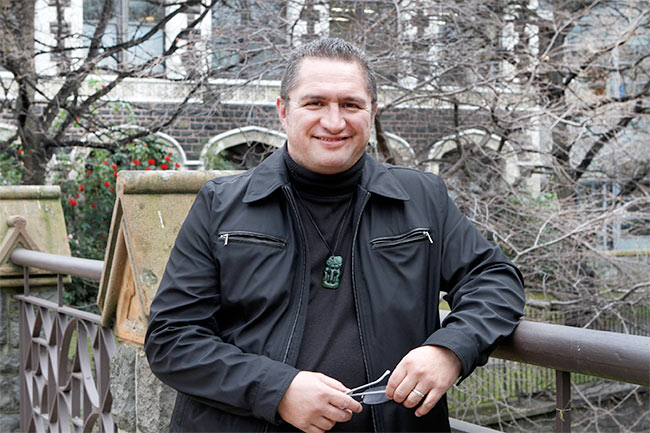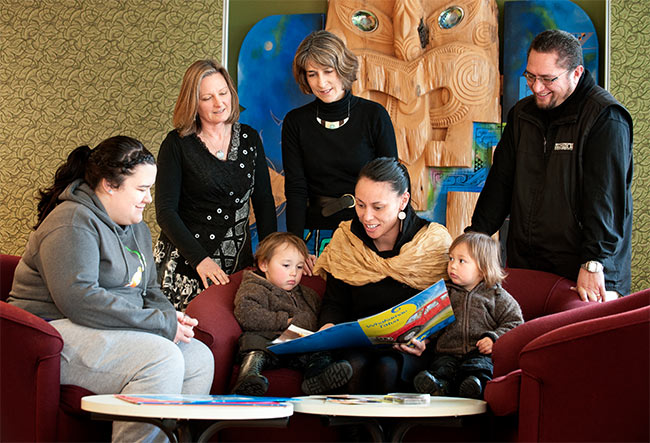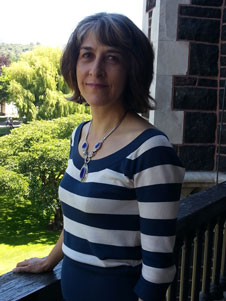Professor Poia Rewi & Dr Katharina Ruckstuhl
Collaborating with local families to reaffirm the Māori language for future generations.
 “If you don't speak the language at home and in the community, the next generation isn't going to pick it up,” says Ruckstuhl. “It could become an extinct language.”
“If you don't speak the language at home and in the community, the next generation isn't going to pick it up,” says Ruckstuhl. “It could become an extinct language.”
Māori speakers in Dunedin and Otago face an uphill battle to keep their language skills alive so they can pass them on to new generations. But soon they could be getting help, following collaboration between local families, Ngāi Tahu and a multidisciplinary team from the University of Otago.
Professor Poia Rewi (Dean of Te Tumu, School of Māori, Pacific and Indigenous Studies), Dr Katharina Ruckstuhl (Research and Enterprise) and Dr Tamar Murachver (Department of Psychology) are running a pilot project to investigate and assist Māori language proficiency – “He Iho Reo: Developing a Tool-box to Support Maori Language Transmission and Maintenance”.
Dunedin and Otago have some of the lowest rates of Māori language use in the country, which makes it difficult for speakers to keep it going.
Ruckstuhl (Ngāi Tahu and Rangitane) had been involved for some time with Ngāi Tahu strategy to support the use of Māori in the home and realised that hard data would help prompt policy change.
Rewi, who this year won the New Zealand Society of Authors' Best First Book award for Whaikorero: The World of Māori Oratory, a work acclaimed as a piece of significant scholarship, is keen to address the Māori language deficit in the region.
Their two-year study began by recruiting and interviewing 10 local families who use the language to various degrees in a range of situations, in the home and community. The next phase was to leave recorders in their homes for a few weeks and then transcribe their conversations to find out how the language was used.
“We know this will not be a 'one size fits all' solution, which is why we need to understand why some things work well for one whānau, but not for another.”

“Initially it's a stock-take of where families are in terms of proficiency and to identify possible problems in speaking Māori, inside and outside of the home,” says Rewi. “Then we can see how we might be able to help them increase access to, and usability of, the Māori language.”
“Without a critical mass of local Māori language speakers, what these families are trying to do is quite difficult,” says Ruckstuhl. “Although it's a small sample, it should identify promising areas for further exploration.
“It's a start in providing hard data that could influence Māori language policy direction in this country. If we are trying to save a language, we have to think very carefully about what our decisions are based on – and research can help.”
The collaborative nature of the project is one of its strengths, according to Ruckstuhl.
“We need people to work together on this. It's like saving the kiwi. One person or group on its own is unlikely to succeed, but, if a lot of people who care work together, then you stand a better chance.”
 The research team appreciates its volunteer families, as well as PhD student Nikita Hall, whose research is part of the project.
The research team appreciates its volunteer families, as well as PhD student Nikita Hall, whose research is part of the project.
Upcoming phases seek to include more students and supportive Māori language communities, such as Kāinga Kārerorero.
Rewi's larger, more challenging goal is to see is a New Zealand more receptive towards the use of the Māori language as a distinguishing feature of our country.
“There's a negative vibe being presented at the moment and that really needs to change. People should feel welcome to use it. We want to reaffirm the Māori language in this area so that future generations in Otago will be encouraged to learn and speak Māori.”
FUNDING - Ngā Pae o Te Māramatanga (a New Zealand Centre of Research Excellence)
